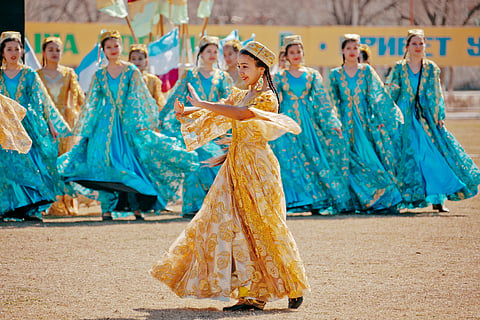
- Destinations
- Experiences
- Stay
- What's new
- Editor’s Picks
- Responsible Tourism
- CampaignsCampaigns
- Subscribe

The ancient festival of Navroz commemorates the dawn of spring and the rebirth of nature. This auspicious day coincides with the vernal equinox, marking the arrival of spring in the Northern Hemisphere. Celebrated with great fervour by Zoroastrians and Shia communities across the globe, Navroz is variously known as Novruz, Nowrouz, Nooruz, Navruz, Nauroz, or Nevruz. This festival, which has been observed for over 3,000 years, has its roots in ancient Iran, formerly Persia. It symbolises a time of renewal and rejuvenation, and the balance of day and night. Navroz holds deep significance in the Zoroastrian religion, which was once the predominant faith of Persia. In India, it is celebrated by the Parsi community in cities like Mumbai, Pune, Hyderabad, and more. Here are some interesting facts about the festival.
The United Nations recognises International Nowruz Day, which has been inscribed on the Representative List of the Intangible Cultural Heritage of Humanity since 2009. According to the UN, this ancestral festivity highlights values such as peace, solidarity, reconciliation, and neighborliness, which contribute to cultural diversity, friendship, and harmony among communities and people. It is celebrated as the start of the new year by over 300 million people worldwide, and has been celebrated for thousands of years in regions including the Balkans, the Black Sea Basin, the Caucasus, Central Asia, and the Middle East.
Its origins date back to Zoroastrianism, and it marks one of the holiest days in the ancient Zoroastrian calendar. The return of spring holds great spiritual significance, symbolising the triumph of good over evil and joy over sorrow. According to Zoroastrian tradition, the Spirit of Noon, known as Rapithwina, is driven underground by the Spirit of Winter during the cold months and is welcomed back with noon celebrations on the day of Nowruz.
The festival is associated with a wide variety of customs and traditions. Although practices may differ from country to country, there are several common features. In most regions, people perform symbolic preparations that involve fire and water before the festival. They also participate in ritual dances that include leaping over fires and streams. Additionally, it is customary in most regions to visit cemeteries before the Nowruz celebrations begin. Visitors bring candles and offerings to remember their loved ones who have passed away.
One common tradition associated with the celebration of Nowruz is the preparation of a special festive table. The Haft-sin table, which is a traditional Nowruz setting, typically features several symbolic objects that hold significance for the occasion. In fact, the Google Doodle for Nowruz 2024 showcases a beautiful design that features intricate floral patterns, traditional calligraphy, and symbolic items such as the Haft-sin table. The table is typically set with a variety of items, including senjid (wild olive), seeb (apple), serka (vinegar), seer (garlic), sabza/samanak (wheat sprouts), sika (coin), and samaroq (mixed vegetables).
Steeped in ancient Persian mythology, a legend has it that King Jamshid was carried through the air in a chariot, astounding his subjects so much that they established a festival in his honour. The festival is also known as Nowruze Jamshidi in some places. Similar mythological narratives exist in Indian and Turkish traditions, but it's the legend of Amoo Nowrouz that is most popular in the countries of Central Asia.
The celebration of Nowruz in India has its origins in the Mughal Empire and the Parsi Zoroastrian community in Western India who are said to have moved to the Indian subcontinent from Persia during the Muslim conquest of Persia between 636 and 651 CE.
Udvada, a seaside town in Gujarat, is one of the best places to experience the Parsi festival. It is considered the most sacred site for the Parsi community. The town is known for its charming streets and houses, and is home to the Iranshah Atash Behram, which holds the holy fire that is over 1,280 years old. This pilgrimage site is of great significance to Parsis from all over the world.
